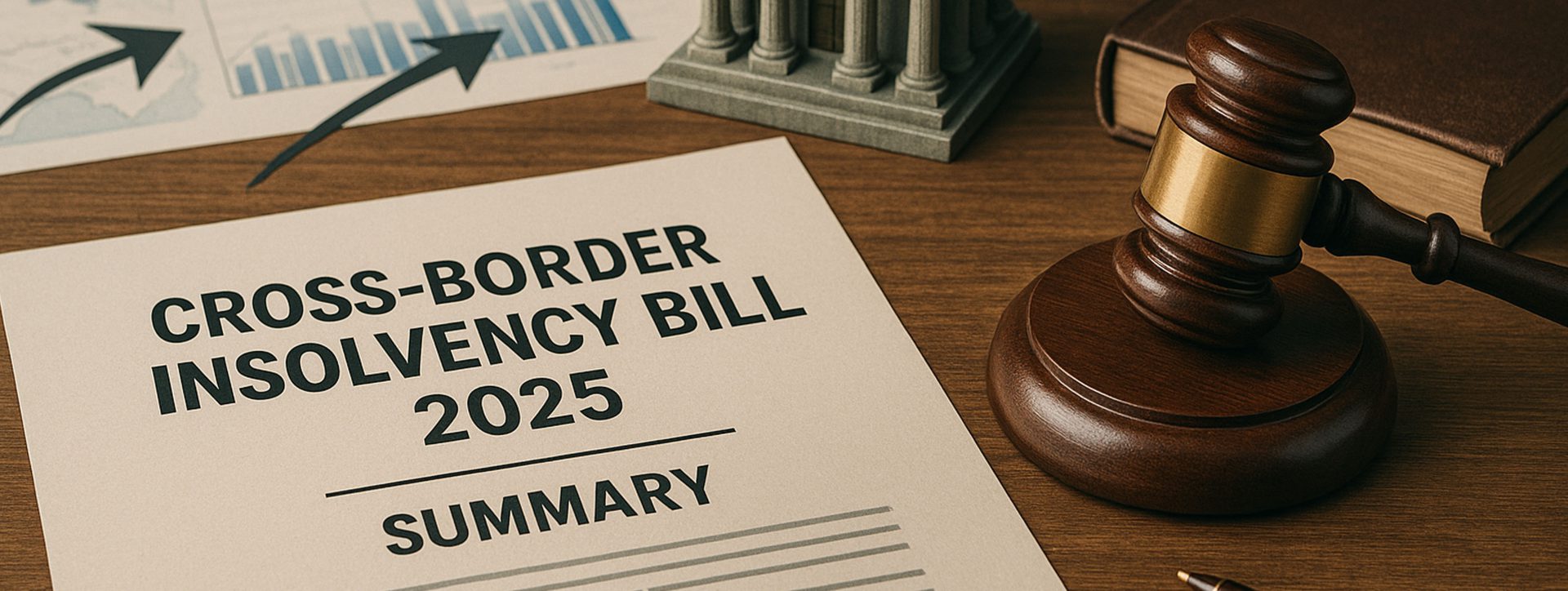
Cross Border Insolvency Bill 2025: Summary and Its Impact on Banks
INTRODUCTION
On 29 July 2025, the Malaysian Parliament passed the Cross Border Insolvency Bill 2025, marking a significant milestone in the country’s effort to modernise its corporate insolvency framework. Inspired by the UNCITRAL Model Law on Cross Border Insolvency (1997), the Bill establishes a comprehensive legal framework to facilitate the recognition of foreign insolvency proceedings and enable cooperation between Malaysian courts and foreign jurisdictions. This move supports Malaysia’s goal of fostering legal certainty in cross-border commercial activities and encouraging international investment.
Background of the Bill
On 21 April 2025, the Minister in the Prime Minister’s Department (Law and Institutional Reform) revealed the government’s intention to introduce new legislation in line with international standards on insolvency. The aim of the proposed law is to meet the increasing demand for effective enforcement and recovery of cross-border debts, while also aiding the recovery of domestic companies involved in international dealings. This Bill demonstrates the government’s dedication to ensuring transparency, consistency, and legal certainty in handling insolvency cases that span multiple jurisdictions.
Key Features of the Bill
The Cross Border Insolvency Bill introduces mechanisms that allow foreign insolvency representatives to apply for recognition of foreign proceedings. It distinguishes between “foreign main proceedings,” which occur in jurisdictions where the debtor has its centre of main interests, and “foreign non-main proceedings,” which take place where the debtor has an establishment.
The recognition of a foreign main proceeding results in an automatic stay on legal actions and enforcement against the debtor’s assets in Malaysia. This protection preserves asset value while restructuring or liquidation efforts are underway. Foreign non-main proceedings may also be recognised, with discretionary relief granted by Malaysian courts to safeguard the interests of creditors and the debtor’s estate.
The Bill promotes direct access for foreign representatives and creditors to Malaysian courts, and encourages judicial cooperation through communication and coordination with foreign courts and insolvency officials. Importantly, Malaysian courts retain discretion to deny recognition or relief if such actions are deemed contrary to public policy.
Summary of Core Provisions
Application and Scope
The Bill applies to corporate entities under the Companies Act 2016 and the Labuan Companies Act 1990. However, it excludes individuals, sole proprietors, limited liability partnerships, foreign limited liability partnerships, and specific entities such as financial institutions, exchange holding companies, and central depositories.
Recognition of Foreign Proceedings
Foreign judicial or administrative proceedings under insolvency law may be recognised in Malaysia upon application by a foreign representative. The court determines whether the proceeding qualifies as a foreign main or non-main proceeding and may refuse recognition if it conflicts with Malaysian public policy.
Effects of Recognition
Recognition of a foreign main proceeding triggers an automatic stay on legal actions, enforcement, and transactions involving the debtor’s property. However, this stay does not prevent secured creditors from enforcing their rights or taking steps to preserve claims. Recognition of a non-main proceeding allows for similar reliefs at the court’s discretion.
Interim and Provisional Reliefs
Before recognition is granted, a foreign representative may seek provisional relief from the court to preserve the debtor’s assets or protect creditor interests. These interim measures help prevent asset dissipation while the recognition application is being processed.
Rights to Challenge Transactions
Upon recognition, the foreign representative may apply to the court to set aside transactions detrimental to creditors. These include undue preferences, fraudulent transfers, and transactions made at undervalue. Applications may also be made under existing Malaysian laws, such as those governing schemes of arrangement and fraudulent trading.
Intervention in Local Proceedings
Once recognition is granted, the foreign representative has the right to intervene in ongoing Malaysian proceedings involving the debtor, subject to compliance with applicable laws.
Implications for Banks
Enhanced Legal Certainty and Debt Recovery
The Bill introduces predictability in managing cross-border insolvency cases, which is beneficial for banks involved in international lending. Clear procedures for recognising foreign proceedings enable banks to better assess risk and pursue recovery efforts with confidence.
Conclusion
As of mid-2025, foreclosure proceedings in Malaysia are defined by strict judicial scrutiny and a firmly established, non-negotiable limitation period for lenders. Recent case law has firmly embedded these procedural standards into legal practice. The law is clear that lenders who fail to meet these standards will risk having their applications struck out. Whether parties act on it is what makes the difference.
Protection of Secured Creditors
Even with the imposition of a stay, banks holding secured interests such as collateral or repossession rights retain the ability to enforce those securities under Malaysian law. This ensures that the rights of secured lenders are not unduly compromised by the recognition of foreign proceedings.
Coordination in Restructuring
For banks engaged in syndicated loans and cross-border financing, the Bill supports coordinated restructuring across jurisdictions. This alignment reduces the risk of conflicting court orders and promotes efficient resolution of corporate distress.
Temporary Delays in Enforcement
While the Bill enhances protection for debtors and creditors, it may result in short-term delays in enforcement actions for banks once a foreign proceeding is recognised. Banks will need to respond with strategic planning and active monitoring of cross-border developments to ensure effective debt recovery.
Greater Need for Legal Preparedness
The new legal framework will require banks to strengthen their understanding of cross-border insolvency law and procedures. Compliance teams may need to be equipped to handle international claims, recognition applications, and collaborative legal strategies.
Criticism and Comments
Limited Scope for Individual Debt Recovery
Although the Bill aligns Malaysia with international standards, it primarily addresses corporate insolvency under the Companies Act 2016 and the Labuan Companies Act 1990. Individuals, sole proprietors, and certain small business entities are excluded. For banks, this means cross-border debt recovery against personal borrowers remains outside the Bill’s streamlined framework, potentially leading to inconsistent enforcement outcomes and higher recovery costs.
Potential for Delays and Procedural Complexity
While recognition of foreign proceedings promotes cooperation, the process of obtaining recognition, provisional relief, and court orders may slow down recovery actions. In high-value cases, banks may face extended timelines before they can enforce securities or access assets, particularly when foreign courts are involved. The reliance on judicial discretion for recognising non-main proceedings could also result in uncertainty, making it harder for banks to predict timelines for enforcement.
Dependence on Judicial and Cross-Border Cooperation
The Bill’s success hinges on effective collaboration between Malaysian courts and foreign jurisdictions. In practice, cooperation may be inconsistent, especially where foreign jurisdictions are not aligned with the UNCITRAL Model Law or have different insolvency priorities. For banks, this creates a risk that recognition granted in Malaysia might not be reciprocated abroad, complicating coordinated debt recovery efforts.
Risk of Asset Dissipation Before Recognition
Although the Bill provides for provisional relief prior to recognition, there remains a time gap in which a debtor’s assets could be transferred, concealed, or otherwise dissipated. For banks, this creates an enforcement risk that may undermine recovery efforts even after recognition is obtained.
Conclusion
While the Cross Border Insolvency Bill 2025 represents a major step forward in aligning Malaysia’s insolvency laws with global standards, its practical effectiveness will depend on how it is applied in real-world scenarios. For banks and other creditors, the Bill offers clearer procedures, stronger legal certainty, and improved prospects for coordinated cross-border debt recovery. However, its limitations, particularly the exclusion of individuals, potential procedural delays, and reliance on foreign cooperation, meaning that it is not a complete solution for all cross-border enforcement challenges. Over time, further refinements and broader adoption of international insolvency standards across jurisdictions may be needed to maximise its benefits. In the meantime, the Bill positions Malaysia as a forward-looking jurisdiction ready to engage more effectively in the global financial and corporate landscape.
Article By
Sharmaine Ilenna Rudy Alexander
*The content provided on this website including the articles represent solely the opinions and viewpoints of the author(s). It is not intended as legal advice and readers should not rely on the information presented herein. Legal matters are complex, fluid and require individualised attention based on specific circumstances. Readers are strongly encouraged to seek professional legal counsel to address their unique concerns. Azhar & Wong and/or the author(s) assume no responsibility or liability for any actions taken or not taken based on the content of this website including the articles herein.
